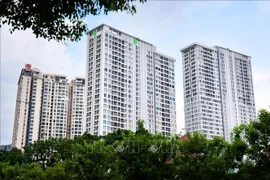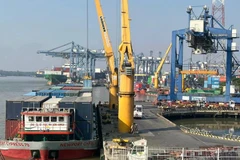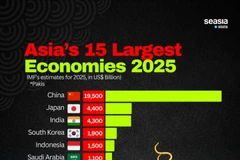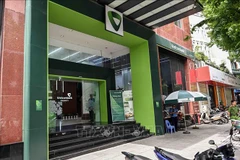Hanoi (VNS/VNA) - As 2024 draws to a close, Vietnam's real estate industry is witnessing a notable surge in corporate bond issuances.
The Huy Duong Group, a relatively young company in the construction sector, recently completed a significant bond issuance worth 900 billion VND (35.4 million USD). The issuance involved 9,000 bonds, each with a face value of 100 million VND, carrying an annual interest rate of 12.5% and a five-year term.
Founded in 2020, the group has aggressively scaled up, transforming from a limited liability company to a joint-stock company with a registered capital increase from 50 billion VND in 2022 to 150 billion VND in early 2024.
The company’s rapid growth is closely tied to its collaborations with MST Investment JSC, a founding shareholder. Together, they are pursuing major projects such as the I-Tower Quy Nhon, a luxury development featuring twin 41-story towers and the Greenhill Village Quy Nhon project, with an investment contract worth 1.81 trillion VND.
These ventures not only reflect Huy Duong’s ambition but also highlight its reliance on external capital to sustain and expand its operations.
Allgreen-Vuong Thanh-Trung Duong, a joint venture established by Vietnam’s Trung Duong Group and Singapore’s Allgreen Properties, raised nearly 1.74 trillion VND through bond issuance to fund its ambitious the Maris Vung Tau project.
Spanning 23ha, this luxury development has faced extensive delays, with construction beginning only in 2018 after a decade-long legal approval process.
In a surprising move, shortly after securing the bond funds, the entity was restructured into a new company – Truong Phu Trading Construction Production Co., Ltd., established just five months earlier. This rapid transformation raises questions about long-term project commitments and financial stability within the real estate sector.
The State-owned industrial development giant Becamex IDC also joined the year-end bond rush, issuing VNĐ1.08 trillion in bonds with a four-year term and a 10.7% annual interest rate. Unlike other issuers, Becamex IDC’s primary goal was debt restructuring, using proceeds to settle obligations with banks such as BIDV and VietinBank.
The company’s robust financial performance - a gross profit averaging over 3 trillion VND annually over the past five years - positions it as a relatively stable player in a sector fraught with risks. Its capacity to leverage 19 land parcels valued at over 1.7 trillion VND as collateral further underscores its prudent financial management.
Industry challenges
Despite the recent wave of bond issuances, the country’s real estate sector continues to wrestle with financial challenges.
According to VIS Rating, property sales in Hà Nội and HCM City increased by 48% in the third quarter, the highest in four quarters. However, more than half of real estate developers monitored by the agency still exhibit weak credit profiles due to high leverage during 2021 - 2023 and unsold inventory amid deteriorating market sentiment.
The challenges are particularly acute for companies facing bond maturities. In the fourth quarter alone, developers must address 22 trillion VND in maturing bonds, of which 13 trillion VND already saw payment delays in 2023.
These bonds are issued by companies related to real estate conglomerates such as Van Thinh Phat, Novaland, Hung Thinh and Sunshine.
While many firms have renegotiated repayment terms with bondholders, smaller issuers with limited operations remain vulnerable to default risks.
Nevertheless, recent regulatory changes aimed at limiting new project debt levels could stabilise the sector in the medium term. Additionally, improving project sales and cash flows offer a glimmer of hope for enhanced debt repayment capacity.
Developers with weak credit ratings may still need to rely on affiliate support or bondholder concessions to avoid defaulting./.




























